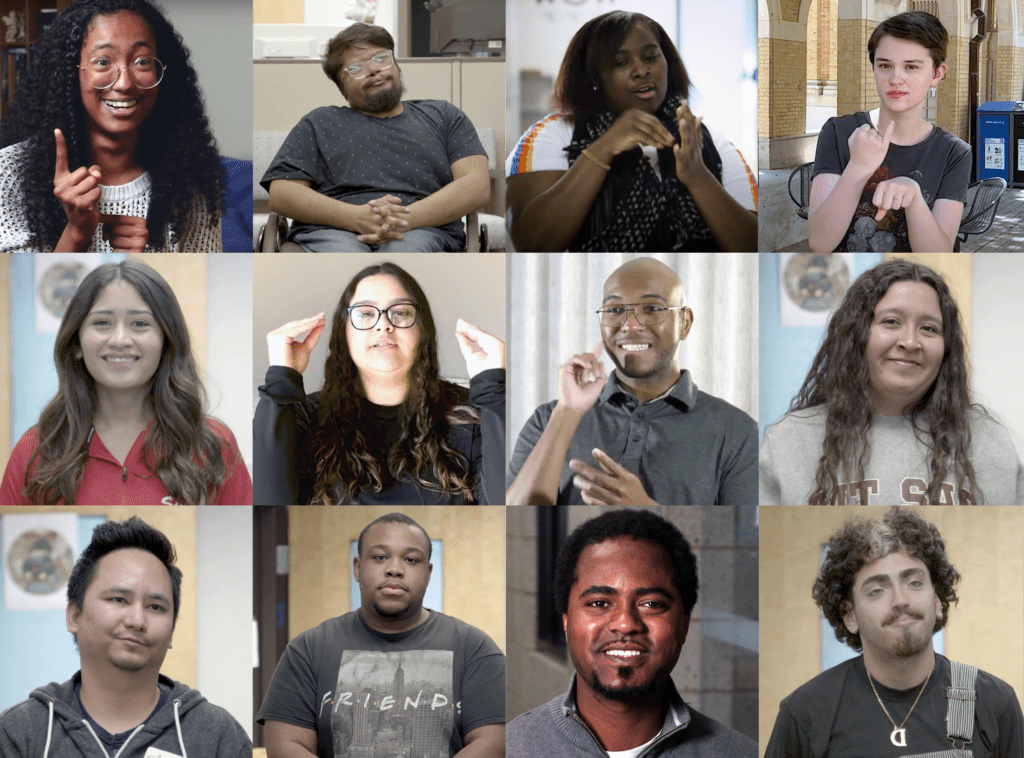Emergency/Crisis Response Resources
Accessibility Recommendations Environmental Emergencies Other Emergency Situations Emergencies and crises—like gun violence, severe weather, health outbreaks (such as COVID-19), or other disasters—can happen anytime, anywhere. These events are becoming more common and more dangerous, making it harder for colleges to respond quickly and effectively. Effective emergency preparedness requires a shift from an “if” mindset to […]
Deaf People and Vocational Rehabilitation: Who Is Being Served?
Authors: Jeffrey Levi Palmer, Carrie Lou Bloom, Savio Woon-Hay Chan, Stephanie Cawthon, and Adam Sales Vocational rehabilitation (VR) services are designed to support disabled people in their pursuit of employment goals. VR provides vocational assessment and evaluation, transition skills development, on-the-job training, career counseling, and postsecondary education and training to reduce labor force disparities. In 2017, VR […]
Deaf with Disabilities: Transition & Postsecondary Education
https://youtu.be/rH65Klgt57g Deaf people have different experiences with disability, and these experiences can evolve over time. It is estimated that nearly half of deaf people have an additional disability. However, in our analysis of currently enrolled deaf college students, we found the incidence of disability to be much lower than expected. Many advocates suggest that the […]
Pre-Employment Transition Services (Pre-ETS)
Vocational Rehabilitation (VR) agencies have made the transition from high school to vocational training, college, and the workforce a priority for students with disabilities, including deaf youth. The Workforce Innovation and Opportunity Act (WIOA) requires that at least 15% of each state VR agency’s federal budget be reserved and expended to provide education and training […]
Rural Deaf Experiences: Employment and Educational Attainment Data

Our data indicate that employment and educational attainment differences persist between hearing and deaf people (Bloom et al., 2024). These differences are more significant in rural areas. Rural deaf people may experience unique and additional challenges, such as a lack of resources and tailored support services. For example, deaf people in rural areas are nearly […]
Making Online Learning Accessible for Deaf Students: A Guide for Disability Services

As of 2019, around 46% of deaf college students had taken online courses—almost half of all deaf students! Many educational activities also happen online, such as office hours, group projects, internships, conferences, or webinars. Deaf students can benefit from online learning in many ways, but thorough and proactive planning is needed for deaf students to experience the most […]
Graduate Student Resource Portal

Are you thinking about graduate school? Or maybe you’re about to start? If so, you’re not alone! More deaf students are enrolling in graduate programs each year. Getting a master’s degree or higher can help you earn more money and open up more career opportunities. On average, deaf people with a master’s degree or higher […]
Self-Determination
Since there are many barriers to postsecondary success, it is important that deaf students have an opportunity to practice and develop self-determination skills. For all students with disabilities, self-determination skills have been proven to be an important predictor of outcomes after high school. On this page, we share resources for parents, teachers, and transition specialists […]
How to File a Complaint
Getting effective accommodations should be a smooth process. You make the request, the accommodations are provided, and the accommodations work for you. But sometimes, the process is not smooth, and you don’t get what you need. As a deaf student, you have the right to file a complaint (sometimes called a grievance) if you do […]
Access, Belonging, and Affirmation

DPAIS 2022–2023 Authors: Jeffrey Levi Palmer, Carrie Lou Bloom, Lore Kinast, and Tia-Nikki Ivanko During the 2022–2023 academic year, NDC surveyed deaf students in higher education institutions across the nation. This report provides a comprehensive overview of survey results and offers suggestions for improving access and participation for deaf students on campus.https://www.youtube.com/watch?v=Vw4I-rOozAc Deaf College Students […]
Sustainable Recruitment and Retention Strategies for Sign Language Interpreters & Captionists
Ensuring equitable and accessible experiences in education and training settings for deaf people includes having a qualified pool of providers. Since the COVID-19 pandemic, colleges have been experiencing provider shortages, as well as, struggling to recruit and retain qualified providers. Knowing this, there are still many opportunities to grow and maintain provider pools. Whether you […]
Protected: Remote Speech-to-Text Services

There is no excerpt because this is a protected post.





